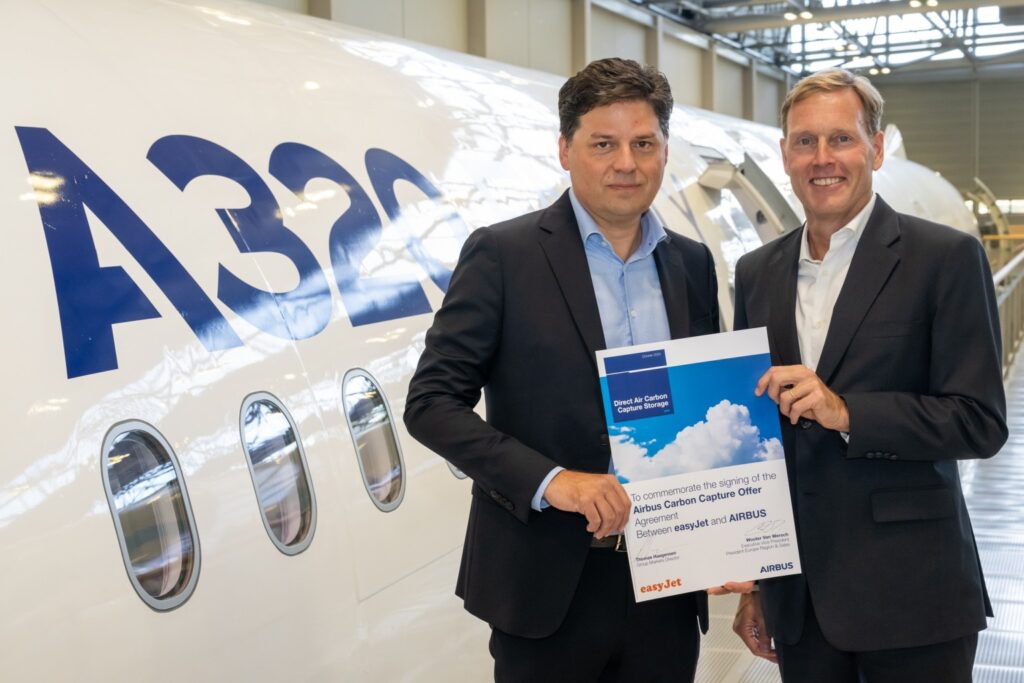easyJet Partners with Airbus on Carbon-Removal Initiative


easyJet partners with Airbus for a pioneering carbon-removal initiative using Direct Air Carbon Capture and Storage technology, marking a significant stride in the aviation industry’s decarbonization efforts. (Photo: Airbus)
easyJet has become the world’s first airline to ink a deal with Airbus for their novel carbon-removal initiative, part of the Airbus Carbon Capture Offer. This initiative harnesses Direct Air Carbon Capture and Storage (DACCS) technology, providing global airlines with carbon removal credits to further their decarbonization aspirations.
DACCS operates by directly extracting CO2 emissions from the air using powerful extraction fans. Following extraction, the CO2 is then securely and indefinitely stored in subterranean reservoirs. Although it’s currently unfeasible to directly negate CO2 emissions resulting from aircraft operations, DACCS offers a solution by equivalently removing the same amount of CO2 from the atmosphere. This approach complements other carbon-reduction strategies, such as the adoption of sustainable aviation fuel (SAF).
In 2022, easyJet committed to a potential pre-purchase of durable and verified carbon removal credits, valid between 2026 and 2029, through Airbus. These credits will be furnished by Airbus’s partner, 1PointFive. The agreement between Airbus and 1PointFive encompasses a pre-purchase of 400,000 tonnes of carbon removal credits over a span of four years.
Airbus has been at the forefront of the aerospace sector’s decarbonization endeavors, with an ambitious goal to launch its inaugural hydrogen-powered commercial aircraft by 2035. Parallel to these efforts, Airbus continually refines its products and services to address climate change. They are also active proponents of several global decarbonization programs to curb the aviation sector’s CO2 footprint.
Key industry-wide targets endorsed by Airbus and other aviation players include:
- Low Carbon Growth: The aviation industry has been proactive in devising and implementing robust strategies to curtail carbon emissions, even as the demand for air travel burgeons.
- Net-Zero Carbon Emission by 2050: Airbus spearheads innovations in aircraft architecture and aerodynamic design to reduce aviation’s environmental impact. Presently, all Airbus aircraft and helicopters can operate with a SAF blend of up to 50%, with a target to achieve 100% SAF compatibility by 2030.
Airbus has undertaken extensive research to expedite the shift to SAF, with trials involving unblended SAF to validate the fuel’s compatibility with aircraft and helicopter engines. Despite SAF fueling over 450,000 commercial flights since 2011, its global production remains a mere 0.03% of total fuel consumption. Reaching the industry’s ambitious goal of net-zero carbon emissions by 2050 would necessitate ramping up SAF production to a staggering 449 billion liters.
To support the growth of the SAF ecosystem, Airbus has actively participated in new fuel pathway certifications, demonstration projects, flights, and political advocacy for over a decade. Their efforts have also birthed advocacy initiatives like the SAF User Group, aiming to expedite blended SAF utilization in helicopters.
Early last year, Airbus announced that it had started to deliver all aircraft produced at its facility in Mobile, Alabama, using sustainable aviation fuel blended with conventional jet fuel. World Energy and Signature Flight Support serve as partners to supply the SAF to Airbus.
—————
Boost Internet Speed–
Free Business Hosting–
Free Email Account–
Dropcatch–
Free Secure Email–
Secure Email–
Cheap VOIP Calls–
Free Hosting–
Boost Inflight Wifi–
Premium Domains–
Free Domains





